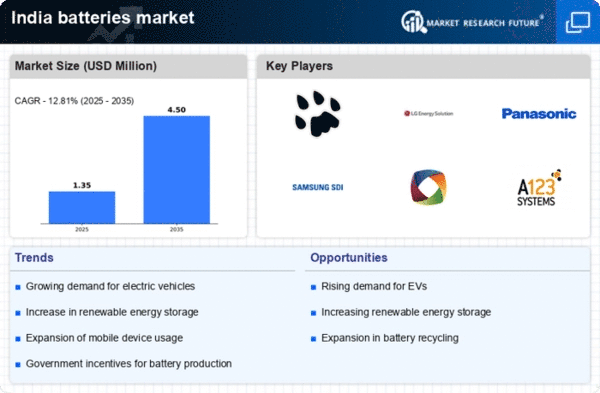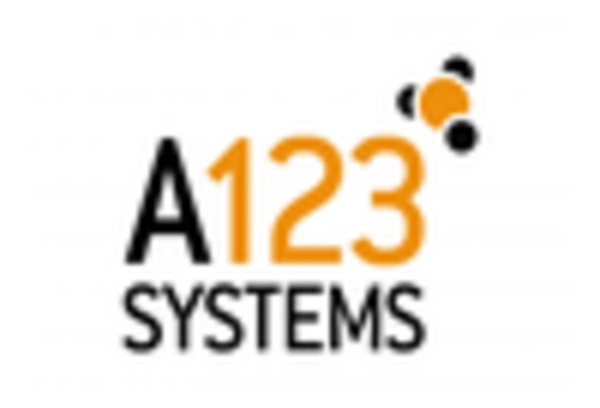Rising Demand for Electric Vehicles
The increasing adoption of electric vehicles (EVs) in India is a primary driver for the batteries market. With the government's push for sustainable transportation, the demand for high-capacity batteries is surging. In 2025, the EV market is projected to grow by approximately 30%, leading to a corresponding increase in battery requirements. This trend is further supported by consumer preferences shifting towards eco-friendly alternatives. The batteries market is likely to see a significant uptick in lithium-ion battery production, which is favored for its efficiency and longevity. As automakers ramp up production to meet these demands, the batteries market is expected to expand, creating opportunities for manufacturers and suppliers alike.
Increased Focus on Sustainable Practices
The growing emphasis on sustainability is reshaping consumer preferences and corporate strategies within the batteries market. As environmental concerns gain prominence, manufacturers are increasingly adopting eco-friendly practices in battery production and disposal. In 2025, it is projected that the market for sustainable batteries could expand by 20%, driven by consumer demand for greener alternatives. This shift is prompting companies to invest in research and development of recyclable and biodegradable battery technologies. Consequently, the batteries market is likely to evolve, with a greater emphasis on sustainability influencing product design and lifecycle management.
Expansion of Renewable Energy Storage Solutions
The transition towards renewable energy sources in India is driving the batteries market significantly. As solar and wind energy installations increase, the need for efficient energy storage solutions becomes critical. In 2025, the energy storage market is anticipated to grow by over 25%, necessitating advanced battery technologies. This growth is likely to be fueled by both residential and commercial sectors seeking to optimize energy usage and reduce reliance on traditional power grids. Consequently, the batteries market is positioned to benefit from innovations in battery technology, particularly in the development of cost-effective and scalable storage systems.
Government Policies Supporting Battery Production
Government initiatives aimed at bolstering domestic battery production are significantly influencing the batteries market. Policies such as the Production-Linked Incentive (PLI) scheme are designed to encourage local manufacturing and reduce import dependency. By 2025, the Indian government aims to increase local battery production capacity by 40%, which could lead to a more robust supply chain. This strategic focus on self-sufficiency is likely to attract investments in battery technology and infrastructure, fostering growth within the batteries market. As local manufacturers ramp up production, the market is expected to become more competitive, benefiting consumers through improved pricing and product availability.
Technological Advancements in Battery Manufacturing
Technological innovations in battery manufacturing processes are reshaping the batteries market in India. The introduction of advanced manufacturing techniques, such as automation and AI-driven production, is enhancing efficiency and reducing costs. In 2025, it is estimated that production costs for lithium-ion batteries could decrease by up to 15%, making them more accessible to a broader range of consumers. This trend is likely to stimulate competition among manufacturers, driving further advancements in battery technology. As a result, the batteries market is expected to witness a surge in new product offerings, catering to diverse applications from consumer electronics to industrial uses.

















